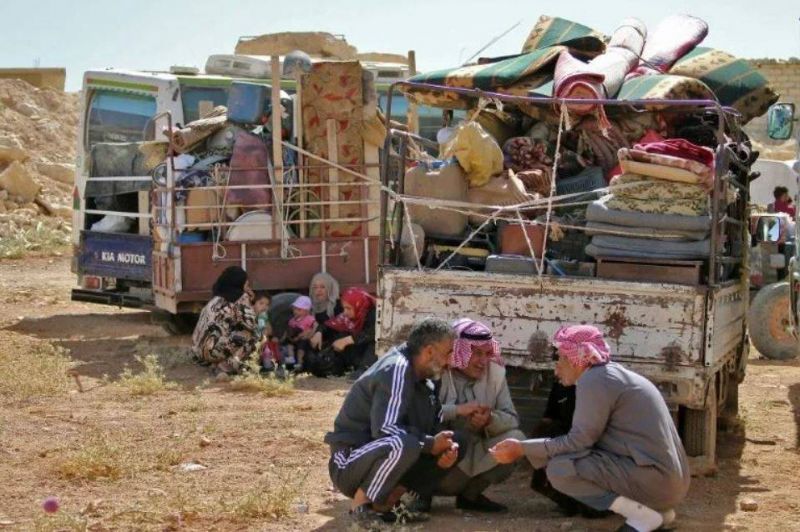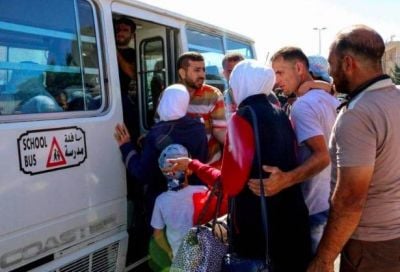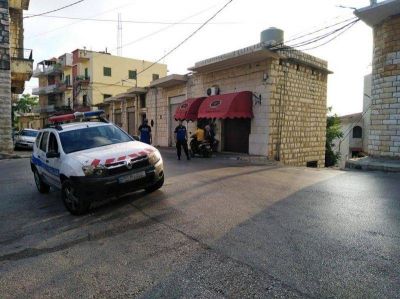
Syrian refugees wait next to trucks before returning to Syria, in Arsal, in 2018. (AFP / File Photo)
BEIRUT —Caretaker Prime Minister Najib Mikati sent a letter Thursday to UN Secretary-General Antonio Guterres asking for a "new approach" from the international community regarding the assisted return of Syrian refugees to Syria.
In the letter, Mikati noted that Lebanon is a small country hosting the world's highest percentage of refugees per capita, despite suffering from one of the most severe economic and financial crises since the mid-nineteenth century.
"While Lebanon is working to address the crisis and control its repercussions, which have put more than 80% of the Lebanese people below the poverty line, the repercussions of the Syrian displacement crisis and its cost on the Lebanese economy, [which] is estimated at more than $3 billion annually, makes it extremely difficult to address the economic crisis," Mikati said in the letter.
The caretaker prime minister did not cite his source of this figure. A World Bank report, released in 2013, estimated that the impacts of the war in Syria could "depress [Lebanon's] government revenue collection by $1.5 billion while simultaneously increasing government expenditure by $1.1 billion due to the surge in demand for public services, bringing the total fiscal impact to $2.6 billion."
A 2020 World Bank report examining the impact of the war in Syria on Iraq, Jordan, and Lebanon found that the conflict accounted for a 1.2%, 1.7% and 1.6% reduction in average annual growth rates, respectively. Both reports accounted for the war's impact on trade and other aspects of the economy, not just the presence of Syrian refugees in Lebanon.
Yet Mikati claims that vulnerable groups of Lebanese citizens have begun to compete with "displaced Syrians and Palestinian refugees" for limited services and resources.
"Lebanon has embraced the displaced and has shown cooperation with the international community to help them while waiting for their plight to end and a sustainable solution to the Syrian crisis to be found," Mikati said in his letter to Guterres, "provided that [solution] is not in any way at the expense of Lebanon."
Mikati went on to accuse Syrian refugees of restructuring Lebanon's demographics, "as the number of Syrian births exceeds that of Lebanese."
Security incidents
Mikati also appeared to fault the presence of Syrian refugees for Lebanon's "high crime rate," which he said is increasing "due to the crises the country has been facing, causing prison overcrowding that exceeds the capabilities of the Lebanese authorities."
In his letter, the caretaker prime minister pointed out that competition for limited job opportunities has led to increased "tensions and security incidents," and a rise in illegal immigration to Europe.
He expressed frustration at the international community's failure to offer a solution that would "return [Syrian refugees] to their country or send them to a third country."
"To date, the international community is completely absent," he said.
Mikati called for a "new approach in dealing with the Syrian displacement crisis before the situation escalates and gets out of control." He urged a timely return of Syrian refugees, citing a "decline in intense military tension in many areas."
The official stance of the UN is that Syria is not safe for mass returns. A recent statement by the UN Refugee Agency (UNHCR) noted that refugees "remain concerned about a combination of factors including: safety and security; housing; access to essential services and livelihoods … [and] until the factors inhibiting refugees’ return are addressed, it is crucial to ensure they continue to be safe and protected in Lebanon.”
UNHCR said in a July statement that it is not part of any negotiations or plans to return refugees from Lebanon to Syria en masse. The statement came one day after caretaker Minister of the Displaced, Issam Charafeddine, announced Lebanese officials are working on a plan to repatriate 15,000 Syrian refugees to Syria every month. The plan has since floundered, but individual cases of deportation have increased, according to some groups monitoring the situation.
In its statement, UNHCR said it “continues to call on the government to respect the fundamental right of all refugees to a voluntary, safe and dignified return and the principle of non-refoulement.”
"It is necessary to confirm Lebanon's adherence to the binding rules of international humanitarian law," Mikati concluded in his letter to Guterres. "[Lebanon] affirms its willingness to cooperate in good faith with international parties, in accordance with the requirements of international law and the necessities imposed by its supreme interest and the interest of its people."

